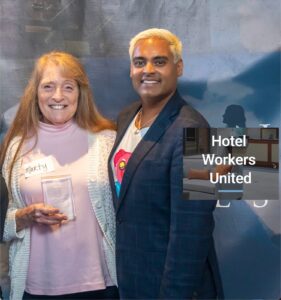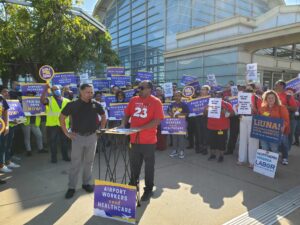Liberalism
The Working Catholic: Signs of the Times by Bill Droel
How do we become aware that a new age has dawned?
Did anyone in November 1492 proclaim that the modern age began the previous month when Native Americans discovered Christopher Columbus (1451-1506)? Did anyone in November 1517 realize that the modern age began the previous month when Rev. Martin Luther (1483-1546) challenged the Roman Catholic bureaucracy? Yet looking back to those events we trace global commerce, exploration, cultural imperialism, a turn to individualism and soon enough new forms of governance.
Did anyone in December 1947 say that modernity has been superseded by a post-modern age because the transistor was invented at Bell Labs the previous month? Did anyone in August 1954 mark the beginning of postmodernism because Elvis Presley (1935-1977) recorded That’s All Right in a style fusing country with rhythm and blues? Yet those events and others were forerunners to a youth culture, to a pervasive cyber-dimension of life, to a view of the earth from outer-space, to instant and world-wide communication of prices, weather patterns, celebrity gossip, political conflict and more.
The same lack of awareness and ambiguity applies to naming generations. After all, someone was born yesterday and someone tomorrow. So, can we really demarcate and easily differentiate Baby Boomers from Gen X from the Millennial Generation?
Yet we need markers to understand our place in history, to understand the forces that shape our lives and contour our agency in our place and time.
Gary Gerstle explores the signs of the times in The Rise and Fall of the Neoliberal Order (Oxford Press, 2022). Gerstle calls each of his stages a type of liberalism. He admits confusion in terminology. For example, today’s neoliberals are usually called conservatives. But whatever the labels, every modern society accepts the basics of classic Liberalism. For example, according to classic Liberalism individuals are not bound by heredity and knowledge (science and reason) is better than superstition. Though the British and others still like the trappings of monarchy, citizens in all classic Liberal societies have a right to participation in governance. Classic Liberalism, no matter the labels of the moment, insists that the rule of law replaces vengeance and property acquired legitimately (including intellectual/creative property) is a protected possession.
Classic Liberalism was influential in the late 1700s and somewhat in the 1800s. It had an intellectual comeback after World War I, says Gerstle, because of economists like Friedrich Hayek (1899), Ludwig von Mises (1881-1973) and others.
Gerstle applies the label New Deal liberalism to the second stage of liberalism. He associates this worldview with President Franklin Roosevelt (1882-1945), to a degree with President Dwight Eisenhower (1890-1969) and with President Lyndon Johnson (1908-1973).
New Deal liberalism differs from the classic type of liberalism in that government, labor unions, associations and consumer groups play a role in society and the economy. The shift recognizes that without countervailing forces individual liberty and laissez-faire capitalism make for “an economic disaster.” The market needs an umpire to enforce contracts, to use the military to stabilize trade, to enforce tariffs and the like. Society also needs government to restrict businesses that disregard the public good, to employ workers when hiring slows, to soften the blows of poverty, to purchase when inflation dampens consumer activity, to tackle big projects (health care delivery, utility delivery, infrastructure construction and the like) when private enterprise is incapable.
Gerstle’s third type of liberalism is called neoliberalism. It harkens back to classic Liberal themes and is thus a reaction against the socially-minded New Deal liberalism of Roosevelt and others. Gerstle associates neoliberalism with Presidents Ronald Reagan (1911-2004), Bill Clinton, Barack Obama and with others.
Neoliberalism promises to recover imagination and serious aspirations in contrast to the deadening bureaucracies of the 1960s and 1970s. It says that private enterprise can be efficient and therefore government should use contractors for toll way collections, public transportation, garbage collection, some overseas military operations, space exploration, schools and more. Neoliberalism favors deregulation, free trade and information technology.
In the neoliberal view all encounters are monetized; that is, everything is for sale—even health care, recreation, personal information and water. Its centers of interest are Wall St., Silicon Valley, Hollywood and tech hubs in the Boston and Seattle areas. For neoliberals “cosmopolitanism [is] a cultural achievement,” writes Gerstle. Regardless of their rhetoric, neoliberalism applies to most Democrat and Republican politicians. Neoliberalism perpetuates an old strain of moralizing common in the rugged individual days. It assumes that some liberty can be denied those who are unable to handle responsibility. Neoliberals distinguish the deserving poor from the undeserving poor.
Gerstle hints that neoliberalism has lost luster and that we might be entering a new phase. The crash of 2008, the disruptions from Covid-19, the incompetence of President Donald Trump’s administration, a brutal war in Europe and more raise doubts about the neoliberal promise. What might be signs of a new era? Reports are welcome.
Droel is affiliated with National Center for the Laity (PO Box 291102, Chicago, IL 60629). It distributes two encyclicals that critique neoliberalism; one by Pope Benedict XVI, the other by Pope Francis ($15 for both).


